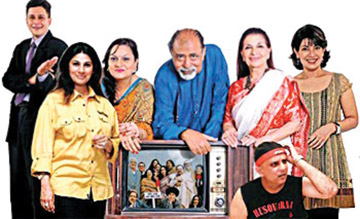Pro-development teledramas for national uplift
A M S Achala Abeykoon
Obviously starting from Dimuthu Muthu directed by D B Nihalsinha,
tele–drama has been one of the most popular television genres. Kadulla,
Kande Gedara, Dunhida Addara, Dhadubasnamanaya, Pitagamkarayo,
Gamperaliya, Gajaman Nona are some of the teledramas that are still
fresh in our memory. However, the popularity of these realistic tele
dramas began to decline with the introduction of dubbed Indian daily
serials, also known as soap operas, to the Sri Lankan TV viewers. With
this change, we began watching three or four Indian serials and their
local carbon copies during prime times.
What is a soap opera?
Soap opera which is different from tele dramas, are dramatic serials
intended to entertain. At its beginning, in USA, there were radio soap
operas and their immense popularity led the way to TV soap operas. The
word ‘soap opera’ was initially invented by the American press in the
1930s. Since 90% of them were commercially sponsored by household
cleaning product manufacturers, the word ‘soap’ has been generated and
‘opera’ refers to its tendency to be larger- than –life and excessively
melodramatic.
|

Soap operas which are different from tele dramas, are dramatic
serials intended to entertain |
Local ‘Mega Series’
Although, we cannot see any of the Indian soap operas or their local
‘carbon copies’ in our TV channels today, their influences are highly
visible in present local daily serials because now every day, we can
watch about seven to eight locally produced tele serials, popularly
known as ‘mega series’ in almost every TV channel not only in nights but
also in daytime. However, the quality, story line and the character
depiction of these serials which can neither be called as tele dramas
nor soap operas are highly questionable.
Effects
of Mega Series
It’s evident that the plots of most of these serials are similar to
each other because many of them are based on typical love stories
between a rich boy and a poor, beautiful girl or a rich girl and a poor
talented boy. Same main actors and actresses are visible in all the
daily serials. And, of course, there is a comic character with
exaggerated acting, most probably who would be a servant of these rich
families or a father of the poor family. Therefore, most of these
stories, although they come in different names, are far from reality and
less serious. Obviously, these light serials create a low taste among
the viewers making them very poor in their media literacy ability.
Moreover, studies on media effects have found out that this type of
entertainment focused broadcasts contribute little of a positive nature
toward the development goals of third world countries because they
encourage anti-development behaviours like consumerism, and create
frustration among the poor and disadvantaged viewers in reaching
material goals.
Pro-development soap operas
Thus, my opinion is that the popularity of these daily serials and
their influence can be positively used for the national development, as
successfully practised in other developing countries. From 1980s, most
of the developing nations like India, Mexico, China, and Brazil have
looked for possibilities to disseminate development communication
messages through soap operas. As a result, the genre of ‘pro-development
tele-dramas or soap operas’ came into existence.
Mexican experience
Pro-development soap opera is a melodramatic serial broadcast to
entertain and to convey subtly an educational theme to promote
development. This conception was originated in 1974 in the Mexican
Commercial TV network. The first pro-development soap opera was aired on
Mexican television during 1975-76, named as Ven Conmigo (Come with me)
intending to promote adult literacy. During its telecast, one million of
illiterate Mexicans have enrolled for adult literacy. Next Mexican
pro-development soap opera was Acompaname (Come along with me) which was
designed to promote family planning of Mexicans. It has been reported
that during this period half a million Mexicans have visited government
family planning health clinics.
Indian experience
Later, this Mexican experience has been used by other developing
nations to disseminate development related ideas among the people. One
such successful attempt was the pro development soap opera created by
India in 1984, named Hum Log (We People). It has been designed to
promote the fair and equitable treatment for women, family harmony, the
adoption of family planning practices, and national unity by using
edutainment strategy. It has been found that an average of 50 million
people watched the average Hum Log.
To be continued |



